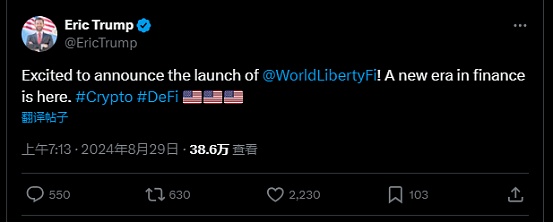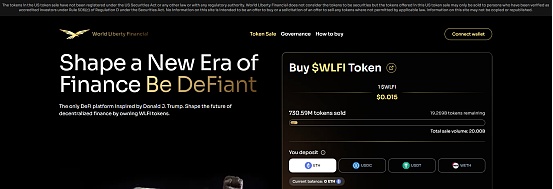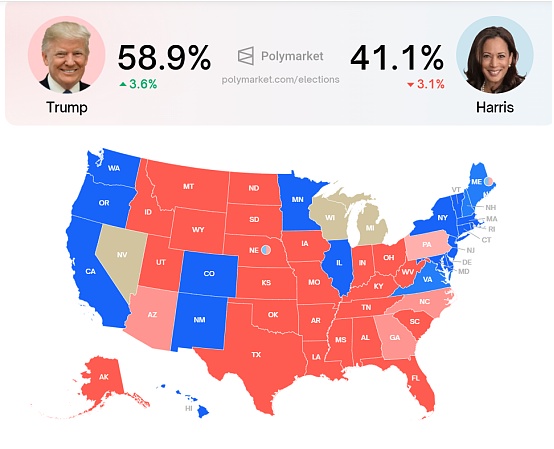Trump, a new move.
On October 15, the Trump family DeFi project World Liberty Financial token WLFI was officially sold publicly. Prior to this, the project had been promoting and warming up for nearly two months. The four members of the Trump family all participated in the campaign, and Trump himself repeatedly stood on the platform of Space and X to call for support, and he has become a new generation of crypto spokesperson.
However, compared with its ambitious fundraising goal of nearly $300 million, the first day of token sales was only more than 10 million, and the goal is still far away. The market has shown signs of desensitization to promises that come out of the blue, resulting in a trend of shrinking bets on Trump, not to mention that the project had previously been controversial for nepotism.
On the other hand, there are still 20 days before the election, and the precise appearance of crypto projects at this time also seems to have a different meaning.
On October 15, the World Liberty Financial token WLFI was officially launched and opened to whitelist users. Just one day ago, the project team live broadcasted and introduced that there were more than 100,000 eligible whitelist users.
Looking back at the development of the project, the warm-up began as early as two months ago. First, Trump's second son Eric Trump suddenly expressed his love for Defi, and then the eldest son Donald Trump Jr. posted that Defi is the future to show his loyalty. On August 16, the eldest son opened the Telegram channel The DeFiant Ones for the encryption project, and continued to announce during the subsequent period, which greatly whetted the market's appetite.
Finally on August 29, the project unveiled its hazy veil, Eric Trump announced the launch of World Liberty Financial (WLFI), and the important guest Trump naturally added fuel to the fire, released a video related to the project, and by the way, he also mentioned the slogan of the US crypto capital.

Although it claims to return the power of finance to the people, in fact, even until the token is released today, the official white paper of the project has not yet appeared, and there is only a "golden paper" to introduce it, and the specific technical details and operation methods are unknown. According to the roadmap obtained by The Block and the integration of the golden paper, a simple glimpse of the project can be obtained.
World Liberty Financial, led by co-founders Steve and Zach Witkoff, Folkman and Chase Herro, aims to promote the mass adoption of digital assets through a compliant one-stop alternative financial platform where users can borrow and lend cryptocurrencies, create liquidity pools and trade in stablecoins. The Trump family is deeply involved in the project. Trump is called the "chief cryptocurrency advocate" in the draft white paper, while Trump's two eldest sons serve as "Web3 ambassadors" and the youngest son naturally serves as the so-called "DeFi visionary."
The roadmap shows that the project is divided into three phases. The first phase is built on Scroll based on Ethereum lending platform Aave, focusing on crypto banks, and this part of the plan has already started. The second phase is to integrate with exchanges to allow users to consume through on-chain proof of KYC protocols. Specifically, the project plans to create a credit card focused on stablecoins. The final stage is to segment real-world assets, that is, to return to the old business, and there may be tokenization of real estate projects.
Although the project plan is vague, the token distribution is quite clear. 63% of the token supply will be sold to the public, of which 17% will be used for user rewards and 20% for the team. The initial token sale will seek to raise $300 million. It will sell 20% of the token supply at a fully diluted valuation of $1.5 billion, with a total of 20 billion tokens. In order to circumvent SEC supervision, the project token sale adopted Regulation D regulations, which limits the scale of sales and only sells to qualified investors. Tokens cannot be transferred twice, but token holders retain governance voting rights for project development.
From the first day of sales, as of 15:30 on October 16, about 730.53 million WLFI tokens have been sold, and the remaining number of tokens is 19.269 billion. Calculated at $0.015 per token, the sales volume is about $10.9579 million. For a brand new project, the first day's fundraising results are impressive, but if compared with the original 300 million plan of the project, it is really far from it.

As for why the market no longer buys it, the reason is quite direct. For a project whose tokens cannot be transferred and whose white paper is unclear, it is risky to spend a lot of money. On the other hand, the project itself has many shortcomings.
First is the project team. Although the Trump family is fully involved, as a traditional real estate giant, they obviously have no experience in encryption. From the title in the white paper, it can be seen that they mostly appear as mascots, increase their influence and wait for money. In this context, the actual project operation and operation naturally fell on Lianchuang.
Among the co-founders, Folkman and Chase Herro both come from Dough Finance, a Defi project founded in April this year based on AAVE, but it was attacked by flash loan transactions on July 12, and $2 million was stolen. The project is now basically stagnant. With this as a previous record, there are rumors in the market that WLFI will directly apply the code, which brings security risks. And Folkman himself has the experience of teaching courses to attract beautiful women to date, which has greatly reduced the market's trust and professionalism.
Sponsored Business Content
Chase Herro's reputation is not much worse. When he was young, he was sentenced to prison for long-term drug involvement. He sold weight loss pills and get-rich-quick courses. Ten years ago, he also launched another crypto trading business called Pacer Capital, which no longer exists.
The reputation of the actual operator collapsed, the Trump family knew nothing about encryption, and the tokens were non-transferable and only used for governance purposes. The purpose of establishing the project was soon questioned.
Some industry analysts believe that the project is just a way for Trump to expand fundraising channels, and in other words, it is an alternative way of political donations. This statement is not groundless. Compared with the Democratic Party, which has always had more funds, the Republican Party’s fundraising has encountered many obstacles. According to the Federal Election Commission documents, as of July 31, Harris’ team raised a total of 770 million US dollars and spent 440 million US dollars, and Trump’s team raised a total of 570 million US dollars and spent 310 million US dollars. According to the latest data, in the three months from July 1 to September 30, Harris's team has raised $633 million, a rare amount and fast speed even in elections. During the same period, Trump only raised $350 million in the third quarter. The gap between the two is huge.
From the perspective of funding channels, Harris's external funding channels are mainly through Carey Commitee, while Trump's are mainly through SuperPAC. Although both have unlimited funding donations, the former can add the "direct donation" function, that is, the amount can be donated directly to candidates and political parties, but the latter can only be used for unlimited expenses such as advertising and publicity, and the funding efficiency is lower than that of Harris's team.
Based on the above reasons, Trump's sudden increase in crypto channels on the eve of the election is quite reasonable. Token sales themselves are a way to make quick money, which does not match the high amount of financing of 300 million US dollars that the project intends to obtain. After all, not every project dares to open its mouth to three small goals just after the tokens are launched, and it is still based on the governance tokens. Of course, this also means that the success or failure of the project is closely related to Trump's election, and the subsequent benefits obtained are more important to donors, but from the current point of view, the Trump family still has high hopes for the project and has also set its sights on the stablecoin, the crypto cash cow.
On the other hand, Trump's launch of the crypto project at this time has further strengthened his own crypto inclination. Reflected in reality, Trump's declaration, which is full of nonsense, has added more authenticity, which is conducive to obtaining key support in the crypto field.
It is precisely because of this that projects with a slight political color are not widely respected. But in terms of winning rate, although Harris still leads Trump by 2 percentage points with a 49% winning rate as of October 10, according to the crypto prediction market, Trump has already overtaken Harris by 17 percentage points with a 58.9% winning rate. In key swing states, Trump has also regained his lead, with Michigan, Pennsylvania and Nevada all surpassing Harris. He is leading in 6 of the 7 swing states. If this situation is deduced, Trump may be only one step away from winning the election.

It is worth noting that in this campaign, a very key Trump supporter is an old friend of crypto - Elon Musk. It is reported that between July 3 and September 5, Elon Musk donated $75 million to the America PAC, which supports Trump. Although it is lower than the previously announced monthly donation of $45 million, the amount also makes him one of Trump's largest donors.
But strangely, back before 2020, Musk was very dissatisfied with Trump's withdrawal from the Paris Climate Agreement and publicly stated that he was a supporter of the Democratic Party. In 2022, the two were the target of online spitting, and Musk bluntly stated in public that Trump should retire. Trump responded that Musk was just a "businessman who relies on government subsidies" and used very spicy language to satirize Musk's previous behavior of coming to the White House for help in project subsidies.
After Trump was assassinated in July this year, the two suddenly reversed their attitudes and turned enemies into friends. In August, Musk and Trump had a conversation on Space, intending to promote him, which attracted millions of people to watch online; in October, Musk appeared at Trump's campaign site to support him, and even publicly spent money to buy votes, saying that he would give $47 for each vote. Coupled with the high donation, Musk can be said to be fully supportive.
As for the reason why the two turned hostility into friendship, according to Musk himself, he supported Trump because the current political views and values of the Democratic Party did not match his own. Musk believed that the Democratic Party's indulgence of racial diversity accelerated the division of the United States, and the subsequent Biden administration's lack of strength in clean energy and automobile electrification, as well as various attacks on SpaceX and Twitter, also strengthened his determination to stand with the Republican Party.
On the other hand, in addition to the pressure of government orders and regulatory direction, Musk himself seems to have a strong interest in politics. From this point of view, choosing Trump, whose political foundation has not yet been fully established and who is far away from the core of the already solid bureaucratic establishment, obviously meets Musk's conditions in terms of business interests and political prospects. At present, Trump has changed his previous attitude and promised to support electric vehicles, and said that after he takes office, Musk can serve as the Minister of Cost Cutting.
But once the arrow is shot, there is no turning back. The public standing of public figures naturally means huge dangers and backlash. Musk once publicly mentioned that if Trump loses the election, he may face strong retaliation from the Democratic Party or personal safety issues. In this context, in order to ensure his own safety, Musk's strong support seems particularly normal.
For anyone involved in politics, the general election is a gamble, and it is difficult to say who will win or lose until the end. Among them, all kinds of verbal battles between the campaign parties are just appetizers, and the bloodless infighting behind the scenes is the real stage. Any action of politicians is based on interests and votes.
Musk's friendship is like this, and the creation of crypto projects is no more than this. As for whether the Defi project World Liberty Financial launched this time can truly serve crypto in the future, the answer may not be cared by anyone.
 Kikyo
Kikyo











